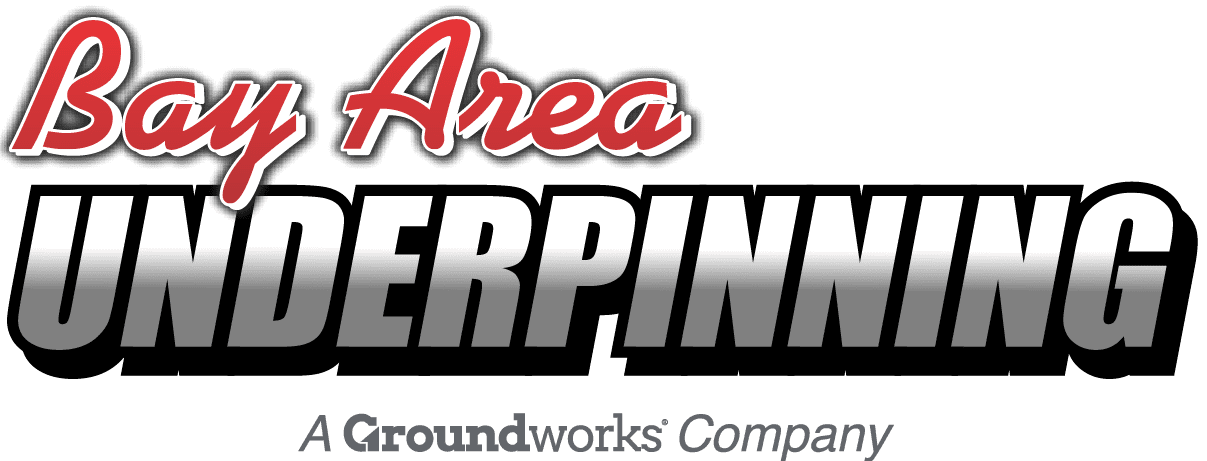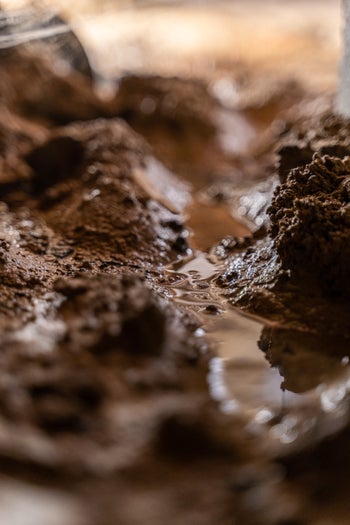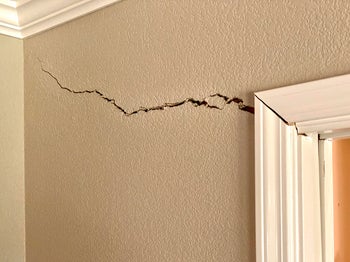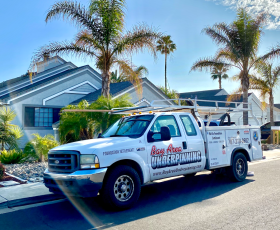10 Common Signs Of Foundation Issues
Table of Contents
1. What Causes Foundation Problems?
2. Foundation Repair Methods
3. How To Prevent Foundation Trouble
Are you looking for the most common signs of foundation issues? If so, don’t hit that back button because you’ve landed on the right page. In this article, we’re going to go over the 10 most common signs of foundation issues, the most common causes of foundation issues, foundation repair methods, and more.
Here are ten common indicators that your foundation may be in trouble:
- Floor cracks
- Wall cracks
- Ceiling cracks
- Uneven floors
- Windows and doors that don’t open and close properly
- Stair step cracks in brick or masonry
- Chimneys and porches that are pulling away from the house
- Ceilings and floors that are separating from the wall
- Moldings that are separating from the wall or ceiling
- Torn or wrinkled wallpaper (The wall behind the wallpaper might be cracked)
If you’re a homeowner, there’s a good chance you’ll have to deal with foundation issues at some point. While most foundation issues can be fixed relatively easily, they can also be expensive and time-consuming. That’s why it’s essential to know the signs of foundation trouble so you can address the problem early on.
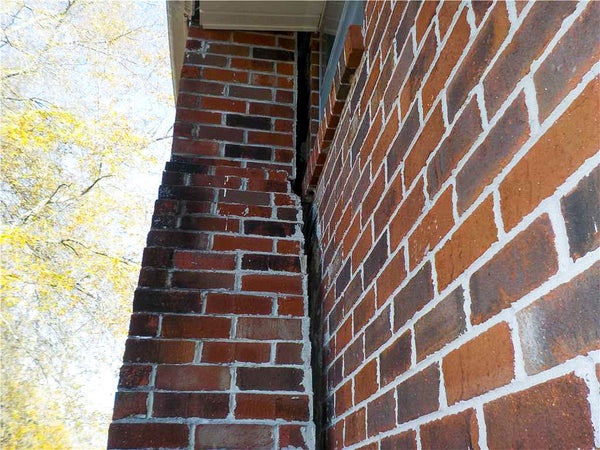
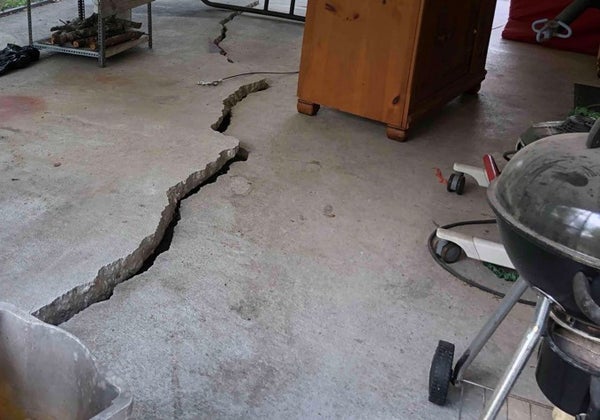
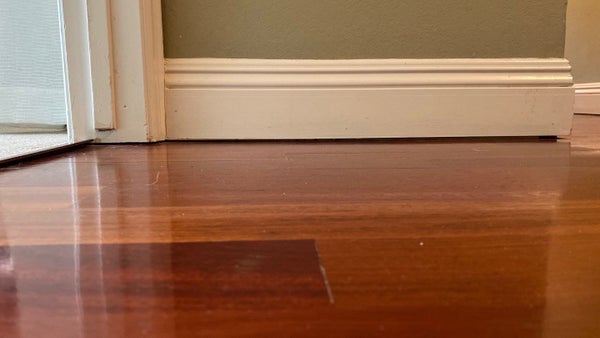
Conduct Routine Maintenance Checks
It’s important to conduct routine maintenance checks on your home’s foundation. This will help you catch foundation issues early before they develop into serious problems that will be more costly to repair. Taking preventative measures is the key to minimizing unpleasant surprises! If the above signs are appearing or seem to only be getting worse over time, it is time to schedule a foundation inspection and assure the integrity of your home’s foundation is safe.
What Causes Foundation Problems?
The most common cause of foundation trouble is differential settlement. This is when a foundation settles into the ground unevenly. While a small amount of uniform settlement is normal after construction and usually nothing to worry about, differential settlement is another matter. Differential settlement can cause severe structural damage if it isn’t corrected.
Differential settlement is caused by various things, including the following:
- Inadequately compacted soil – Soil needs to be tamped down before you build something on top of it. If this isn’t done correctly, the structure will settle unevenly into the soil after construction leading to differential settlement.
- Expansive soil – Expansive soil contains a high percentage of clay, and because of this, it swells quite a bit as it soaks up moisture and then shrinks as it dries out. This creates movement under the foundation, and over time, this can cause differential settlement.
- Natural disasters – Earthquakes, landslides, sinkholes, floods, hurricanes, etc., can all cause differential settlement and severe damage to a foundation.
- Weather changes – An example of this would be building on top of expansive soil during the dry season. When the wet season returns, the ground swells, creating movement under the foundation, which can lead to differential settlement.
- Excavation next to the foundation – Excavation or construction occurring close to the foundation can cause differential settlement.
- Erosion-prone soil – Some types of soil are prone to erosion which could cause voids to form under the foundation. If the foundation sinks into the voids, it will lead to differential settlement.
- Improper Drainage – Proper drainage around the home is another factor that could lead to the foundation experiencing settlement a lot quicker than expected. Water needs to properly drain away from the foundation. In some cases a french drain can help with foundation issues.
Foundation Repair Methods
There are multiple foundation methods, including underpinning using push piers, helical piers, slab piers, and drilled concrete piers. The good news is that you don’t have to worry about which is right for your situation because the foundation repair contractor will decide that after inspecting the foundation and taking elevations.
Resistance Push Piers
Resistance push piers are designed to lift and stabilize a structure by transferring its load to stronger soil layers or bedrock below. The piers are driven into the ground using hydraulic pressure and the weight of the building.
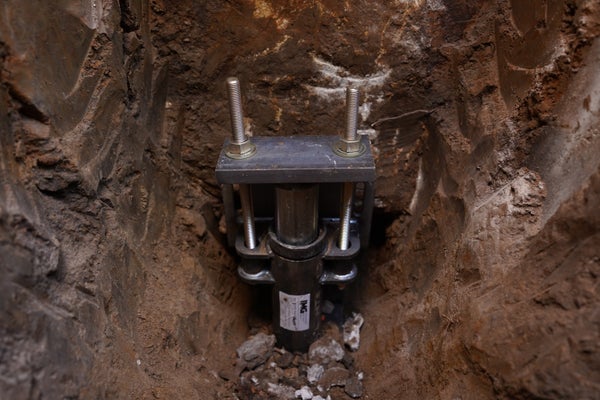
Helical Piers
While helical piers are usually used for new construction projects requiring a deep foundation system, they are sometimes used to underpin existing foundations that are failing. They’re screwed into the ground and use torque to support the building above.
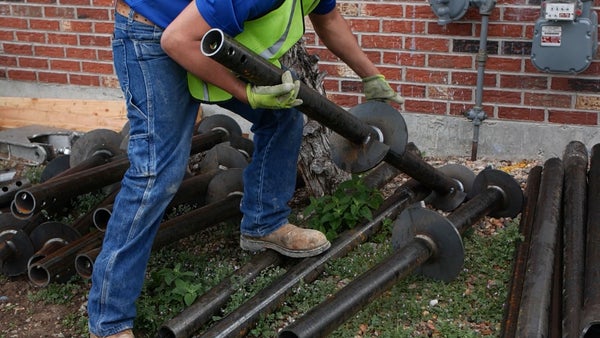
Slab Piers
Slab piers are piers that are installed through the interior of the home’s slab. If the foundation of the home is a slab foundation and not a crawl space, we will install slab piers as needed per the repair plans or if our engineer suggests for maximum recovery and successful stabilization of the foundation.
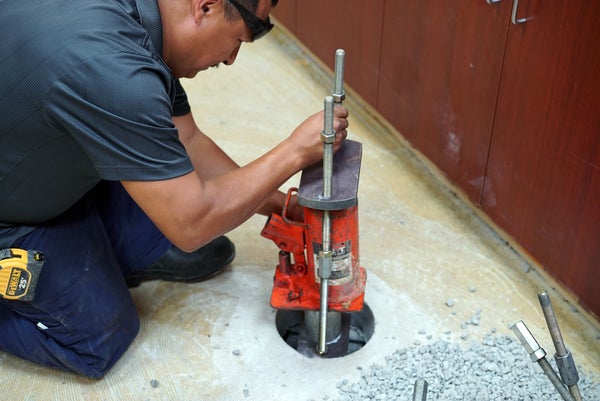
Drilled Concrete Piers
Drilled concrete piers are made by drilling holes into the ground to reach a stable soil layer, then inserting steel reinforcement rods before filling the hole with concrete.
Screw Jack Replacement
Problems with crawl space support piers can usually be fixed by either installing new screw jacks or removing and replacing the existing screw jacks.
How To Prevent Foundation Trouble
When it comes to keeping your home’s foundation healthy, the key is to control groundwater. With the right preventative measures, you can protect your home’s foundation for years. Here are a few things you can do:
- Ensure that the yard slopes away from your house. If not, regrade the yard, so water does not drain toward and pool around the foundation.
- Install downspout extensions to lead rainwater away from your foundation.
- Clean your gutters regularly so that water doesn’t spill over the side of your home and soak the ground around the foundation.
- Don’t plant flowers and shrubs next to the house.
- Install an underground downspout and pop-up emitter. The downspout collects and directs rainwater off of your roof and down into a buried pipe leading away from your home. When full, the pop-up emitter rises to disperse the water away from the foundation.
- Install a drain tile system. When it comes to foundation waterproofing, nothing beats a drain tile system because it prevents excess moisture from building up in the soil around a foundation.
If you think your Northern California home might have a foundation issue, contact us today to schedule a free foundation evaluation. If we find a problem, we’ll also give you a repair estimate.
More Resources
Publish Date:
Last Modified Date:
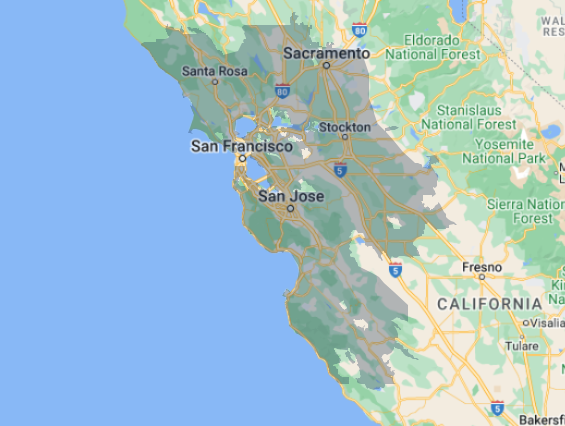
Our Locations
2333 Courage Dr. Suite C
Fairfield, CA 94533
1161 N Fair Oaks Ave
Sunnyvale, CA 94089
